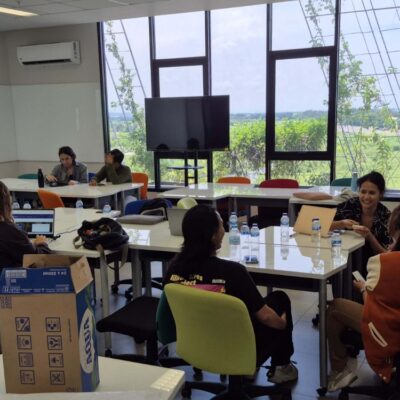When the COVID-19 pandemic broke out globally in early 2020, the then Australian Prime Minister Scott Morrison in April told international students studying in Australia to ‘make your way home’. This was a bleak directive from the perspectives of international students, showing that they were viewed largely as merely an international education ‘commodity’. Hundreds of Indian international students subsequently tried to leave Australia for India at a short notice, and many did. (Some were unable to secure a flight and were essentially stranded in Australia.)
International education was Australia’s fourth largest export before the COVID-19 pandemic and India is the second largest contributor to the sector. International students are temporary migrants who contribute a huge amount to the Australian economy as well as filling jobs in the hospitality, retail, and care sectors that most Australians shun due to long and arduous working hours and low wages. International students also contribute to the accommodation and transport sectors while in Australia. Yet, these factors were swiftly forgotten as Australia closed its international borders and stopped international flights to contain the virus and told its temporary migrants to return home.
This article focuses on the experiences of Indian international students during March 2020-June 2022 who had managed to leave Australia and return to India. Our original research survey was to address the concerns of Indian students stranded in Australia after the national border closed, but it drew only 20 responses. Two of the respondees were administrators of a WhatsApp group with over 250 members who were Indian students who had returned to India after statement to ‘make your way home’ by the Prime Minister. These students formed two WhatsApp Groups – ‘Visa 485 Lives Matter’ and ‘TR Visa Holders’. They allowed us access to these groups for research purposes. What is shared in this qualitative research is based on digital ethnography as participant observers in these WhatsApp groups.
The use of instant messaging platforms such as WhatsApp for civic and political purposes is reportedly growing faster than any other social media platform. WhatsApp is one of the largest platforms—more than 400 million Indians use the app in India and it is also widely used by government.
Through observing the messages in these two groups, we traced aspects of the students’ lives for approximately two and a half years from the time they left Australia for India. We examined their use of social media as a tool for activism during the pandemic using network connectivity to share their experiences and strategies to fend for themselves. We outline and summarise their fears of being abandoned by Australia, and demands that the Australian government address their plight being unexpectedly ‘stranded’ in their home nations.
Packing up their lives in Australia and arriving back in India
The then Prime Minister’s advice to return ‘home’, potentially applied to many of the 143,999 Indian students enrolled in Australia in 2019. Many found that their previously purchased return airline tickets became worthless as major international airlines were grounded, so their first task was to draw on savings or borrow funds to purchase new tickets. Many then tried to sort out their accommodation by paying upfront rental for a few months in advance or moving their belongings to friends’ accommodation. Those who owned cars or other forms of transport, parked them in secure places until what many expected at the time to be only several months until they returned. The students used their pre-pandemic WhatsApp groups to share information, as well as their personal situations.
Uncertainty and difficulties in India
While many of the students were forced to rely on their families for financial support in the early weeks and months of 2020, many also faced situations where their families were also suffering from the virus itself, as well as the economic consequences of government-imposed restrictions on movement. Many students applied for jobs when they arrived back in India, but most were turned down because they had left evidence of their qualifications behind in Australia.
As 2020 progressed and the pandemic worsened, students started becoming anxious about the status of their temporary graduate visas (subclass 485). This visa category allows international students recently graduated from an Australian institution, to live, work and study in Australia for up to four years, depending on which visa stream they are granted. The majority of students interviewed had just completed their studies and were hoping to gain work experience in Australia aligned to their Australian education. It is during this period, when trying to find out what would happen to their expired/about-to-expire visas, that students became very anxious and began to voice their frustration and anger at their treatment by the Australian government. They sensed that as they were now ‘out of sight, out of mind,’ the Australian government had no concern for them.
The United Kingdom and Canada began allowing international students to return in October 2020, but Australia’s borders continued to be closed to international students. Students in India began to ask themselves whether their parents had spent a fortune to educate them only to find themselves unable to gain work experience in Australia. Had they not paid their taxes, rent, medical insurance and left everything behind to obey the Prime Minister’s directive? These questions occupied the minds of the students, who were not receiving any answers from the Department of Home Affairs in Australia about their situations. Neighbours started asking whether they were in India because they had done something wrong in Australia. These feelings of distrust, loss of face and status among family members and neighbours coupled with a lack of communication from the Department of Home Affairs led many students to feel despair. Most stopped going out, even to exercise, in order to avoid having to face continuous questions from their neighbours, friends and extended family. Focusing on other events in Australia such as the trending social media hashtag #DjokovicGoHome (in relation to the deportation of tennis star Novak Djokovic because he was deemed to be a threat to public health) students expressed feelings of anger that their plight and suffering was not receiving much attention. Indian students began calling on Indian members of parliament and councillors to address their issues and concerns.
Growing activism
The students created two specific WhatsApp groups in late 2020 consisting of members who found themselves in similar situations. The administrator states that the groups’ primary purpose was, at first, to update each other on information received from the Department of Home Affairs on their visa status. However, the groups grew into a platform for activism.
In January 2021, various international students started giving interviews to the Australian media and sharing these media videos with members of the WhatsApp groups. The interviews also began to attract attention of others, including on other social media platforms such as Twitter as well as mainstream media attention. There was also discussion about what action members could take. It was suggested that they try to arrange for a live video call with the Department of Home Affairs, to discuss on the way forward in handling their Visa 485 status. The suggestion for the video meeting (which didn’t end up taking place) and collective decisions on action are the first signs of emerging activism within the group. Some differences of opinions coalesced; others remained. For instance, there was growing resentment that only 10 percent in the group were working actively for their ‘dignity’ whilst 90 percent remained quiet.
In August 2021, India’s High Commissioner to Australia, Manpreet Vohra, upped the ante by saying that Australia risked eroding its reputation as an education destination through prolonged travel restrictions. He stressed the importance of an effective and transparent action plan. Vohra urged the Department of Home Affairs to specify a timeframe for the return of Indian international students, who were frustrated that Hong Kong students were being allowed into Australia to work unlimited hours including obtaining 485 Visas that could lead to permanent residency. Compared to Hong Kong students, they felt that were being neglected for other new locations of international students, particularly as they were yet to receive any communication from Australian authorities vis-à-vis their return to Australia or their visa status.
The treatment of Indian-Australian citizens’ returns added fuel to their distress. On 27 April 2021, the Australian Government implemented a two-week ‘temporary pause’ on direct flights between Australia and India and on 30 April 2021 announced a ban on all travelers from India, including Australian citizens and permanent residents. This unprecedented travel ban, prompted by the breakout of the Omicron variant in India, heightened feelings of angst among students at being differentiated when other European Australian citizens from Europe had been allowed to enter at the height of COVID-19 in Europe. Some students posted on the WhatsApp group their view that the reason for their neglect was because Indians didn’t have sufficient political clout or financial importance. Others treated this as an element of racism.
In the absence of response to thousands of letters and emails to the Department of Home Affairs in 2021, the students decided to try to inundate the Department with phone calls. Although many were kept on hold for several hours, eventually the Department responded that it would update its website with relevant information. In the meantime, they also received advice from supporters in Australia advising them they could frame themselves as part of the solution to the challenge of staff shortages that Australia was facing due to the national border closure. Hundreds of other international student bodies and migrants’ groups retweeted messages, possibly intensifying the need for Department to respond.
On 18th January 2022, students received information from the Department that it would allow current and former temporary graduate (subclass 485) visa holders to re-enter Australia and apply for permission to stay. In some ways, feeling more confident that the end was in sight, there was greater cohesion within the group and members who had previously remained silent began to voice appreciation for the efforts of the active members of the group. However, who would be classified as eligible to re-enter Australia was confusing for some, who ended up quarrelling with each other on the meaning of the information from the Department. Members posted that this was probably the most difficult hurdle: whether they met the eligibility criteria or not.
The next set of postings discuss several fears: that the Australian government would again restrict their ability to re-enter Australia and that they might be stopped from leaving India due to a ban imposed by the Indian government on 20th January 2022 amid the Omicron virus surge. During this period, the WhatsApp activity reveals many students clearly stressed. Their messages underscored the state of their mental health having waited for two to three years in India, and continued confusion over what would happen next. Many sought reassurances from migration agents’ who had started uploading videos addressing the changed immigration policies.
Returning to Australia – light at the end of the tunnel
On the 18th of February, the Department of Home Affairs updated its website stating that effective from the 19th of February, visa holders could verify their visa status using the online app VEVO. The students would be individually notified by email on requisite requirements.
Much of the conversation among the students on WhatsApp focused on asking who had received the email from the Department and clarity on requisite requirements for return. A screenshot of the notification from the Department was shared. Students now knew what to look for via email, but the tension was building among the group in anticipation receiving an email.
Following enquiries from students that not a single student had thus far received an email from the Department, then opposition Senator Nick McKim raised the issue with the Department on the 15th of February, 2022, in Parliament, during a Senate Committee. Senator McKim asked ‘whether all [emphasis own] students stranded overseas during the pandemic would receive an automatic 485 visa extension allowing them to travel to Australia’. Upon receiving a response from the Department, he again reiterated that “all [Senator McKim emphasis] students stranded overseas during the pandemic would receive an automatic Visa 485 extension. The Department then advised that the ‘extension is for all Visa 485 holders who were overseas and held a 485 visa during the COVID period – for both primary applicants and dependent applicants.’
A video of this parliamentary exchange was shared on Facebook, receiving 380 likes, 119 comments and 44 shares. It was also shared on the WhatsApp groups. One message read:
Thanks Senator Nick McKim You have done the awesome Job for the whole of the time. We want to give our thanks from the core of our heart. You were the engine of our campaign that helped and push[ed] it to success. Thanks a lot [emoji thanks sign].
Another read: We can never thank you enough for that Senator Nick McKim!!!!
Their pent-up anxiety was displayed through messages such as ‘it’s ok bro [brother], we’re getting there’ and emojis of happiness and tears. The news prompted more discussion about flights and accommodation, as well as information about job opportunities in Australia.
Australia notified students that it would allow tourists and students to enter Australia from July 2022 onward with details on vaccination status, compliance with testing and quarantine requirements on arrival, and other formal documents required by Australian authorities. With this information, students began to further relax, they discussed the best flight fares, joked about an image referring to the Department of Home Affairs with the words ‘Keep Calm and Don’t Forget About Us’ and shared everyday aspects of their lives not directly related to their shared plight.
Conclusion
At the beginning of the pandemic, when then Australian Prime Minister Morrison told international students they should return to their countries of origin, thousands of Indian international students felt obliged to return to India and essentially became stranded there due to Australia’s national border closure. Despite being full fee-paying students and contributing in many significant ways to the Australian economy, the Department of Home Affairs did not address their inquiries about their visas and their return to Australia. With their visas to Australia expiring and their anticipated three to six month return to India extending to two years, the students took to online activism to raise awareness about their situation and plead their case with Australian authorities. Their shared WhatsApp groups became an online forum for solidarity, building a collective identity and support networks and, importantly, coordinating actions for advocacy.
Authors: Dr Surjeet Dogra Dhanji and Dr Mousumi Mukherjee
Image: Lecture theatre. Credit: RawPixel




